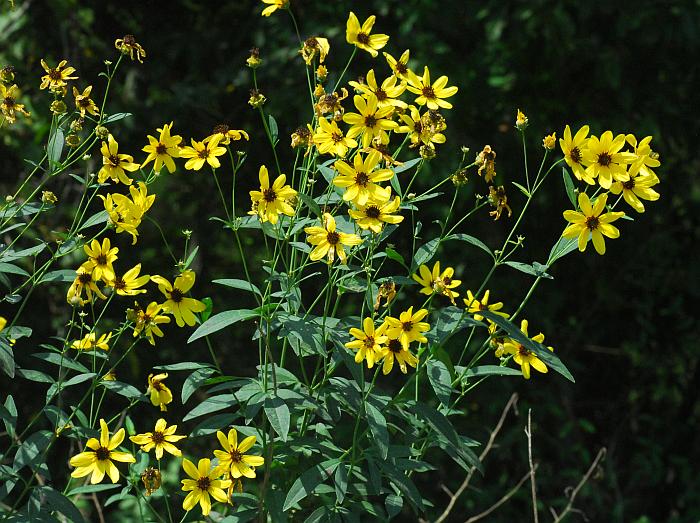Coreopsis tripteris L.
Tall Tickseed

Native
CC = 6
CW = 0
MOC = 58
© SRTurner
Coreopsis tripteris L.Tall Tickseed | |
 |
Native CC = 6 CW = 0 MOC = 58 |
© SRTurner |
|
Family - Asteraceae/Heliantheae Habit - Perennial forb, with short, stout rhizomes. Stems - Ascending to erect, to 1.8 m, glabrous, sometimes glaucous, hollow, branching in apical half.
Leaves - Opposite, petiolate, palmately trifoliate, distributed at 10 or more nodes along most of the length of the stem. Blades 3-12 cm long, mostly broadly obovate in outline, all but the uppermost ternately or palmately deeply divided or compound with 3 or less commonly 5 divisions or leaflets, these entire, 5-25 mm wide, lanceolate to narrowly elliptic, angled or tapered to a slender attachment point at the base, angled or tapered to a bluntly or sharply pointed tip, the surfaces glabrous or sparsely to densely hairy with short, curved hairs. Petioles glabrous, to 2 cm long, with bases of opposing petioles joined in a collar surrounding the stem. Lateral leaflets sessile. Terminal leaflet with a short petiolule (to 5 mm long).
Inflorescence - Mostly appearing as loose, open clusters or panicles, the heads with the stalk mostly 2-6 cm long.
Heads - Radiate, showy, often numerous per plant. Involucre cup shaped, the bracts dimorphic, the outer series 2-5 mm long, green, linear, glabrous or sparsely to moderately hairy; the inner series broader, 6-9 mm long, yellowish. Chaffy bracts more or less linear, with a slender base, sometimes slightly thickened toward the rounded or angled, bluntly to sharply pointed tip. Receptacle flat.
Ray flowers - Sterile, typically 8 per flower head, the corollas 12-25 mm long, entire or with 2-4 minute teeth in the center of the otherwise more or less rounded tip, uniformly yellow (sometimes with fine, purplish veins). Achene compressed, to 3.5mm long in flower, yellowish, mostly glabrous but with some pubescence at apex. Pappus of short eros scales. Disk flowers - Perfect. Corollas 5-6 mm long, 5-lobed, reddish purple, sometimes with a yellow tube. Style branches tapered abruptly to a sharply pointed, sterile tip. Pappus absent or more commonly of 2 awns to 0.5 mm long Stamens 5, fused at apex of contracted portion of corolla tube. Filaments white, glabrous, compressed, 2.1 mm long, with an obvious midvein. Anthers purple, to 2.3 mm long, fused around the style. Style glabrous, pale yellow, slightly swollen at base, bifurcate, purple in apical stigmatic portion.
Fruits - Achenes 4-7 mm long, the base and tip appearing slightly arched inward at maturity, the angles with narrow, pale wings having entire margins and occasionally with a few hairs at the tip, the inner face not thickened at the ends, dark brown to black, the surfaces smooth.
Flowering - July - September. Habitat - Prairies, rocky open woods, bluffs, ledges, fields, roadsides, railroads. Origin - Native to the U.S. Lookalikes - Other species of Coreopsis, Helianthus, Bidens, etc. Other info. - This tall species of Coreopsis is found throughout most of Missouri, as well as most of the eastern half of the continental U.S. With some attention to detail, the plant is not hard to identify in the field. Like all members of the Coreopsis genus, this one has involucres with two distinctly different types of bracts. The heads have brown-purple disks, and many of the leaves are trifoliate, with the lobes diverging right at the base. Photographs taken at Logan Creek, Reynolds County, MO., 7-17-03 (DETenaglia); also at Reform Conservation Area, Callaway County, MO, 9-15-2012, and Little Lost Creek Conservation Area, Warren County, MO, 9-6-2015 (SRTurner). Achenes for imaging supplied by KBildner. |